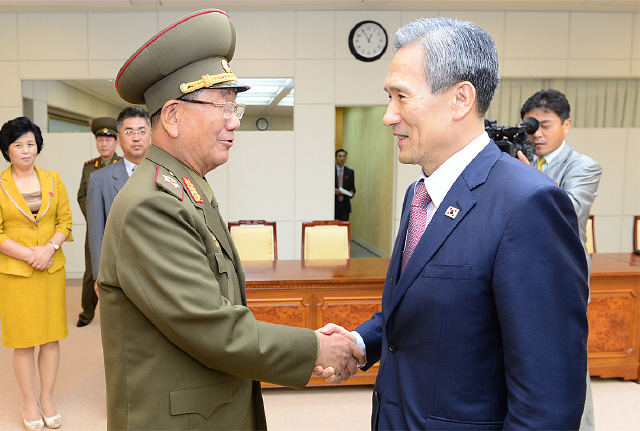Posted on : Aug.27,2015 15:52 KSTModified on : Aug.27,2015 15:52 KST
 |
Blue House National Security Office chief Kim Kwan-jin shakes hands with North Korean military politburo chief Hwang Pyong-so after signing the joint statement to end their marathon meetings at Panmunjeom Peace House, in the early hours of Aug. 25. (provided by the Ministry of Unification) |
To be determined are the agenda, location and level of the delegations at meetings two sides plan to hold soon
Following the South Korean government’s announcement on Aug. 26 that it would start preparing for inter-Korean talks, the next questions are the timing and agenda of the talks, which the two sides agreed to hold soon.
The South Korean government has reportedly started taking steps to rebuild the framework for inter-Korean dialogue that collapsed during the administration of former president Lee Myung-bak.
“We are building a new system for inter-Korean dialogue for the Park administration that will incorporate the ’two-plus-two‘ high-level dialogue framework that achieved success in the recent negotiations,” a senior government official said on Aug. 26. This implies that the government means to put together a new kind of negotiating framework that will be different from the one used in previous administrations.
During the administrations of former presidents Kim Dae-jung (1998-2003) and Roh Moo-hyun (2003-2008), the main framework for dialogue consisted of talks between ministers and a vice minister-level economic cooperation committee, along with a variety of working-level meetings for bureau and office chiefs.
In the second half of the Roh administration, talks between prime ministers and a vice prime minister-level inter-Korean joint economic committee were established as a framework for implementing the joint statement adopted by both sides on Oct. 4, 2007, but this framework was basically discarded under the next president Lee Myung-bak.
In relation to this new framework for dialogue, the South Korean government is reportedly considering the option of holding the two-plus-two dialogue - a format that first appeared during the recent round of high-level talks - on a regular basis. The two-plus-two format brings together South Korea’s Blue House National Security Office Chief and Unification Minister and North Korea’s KPA General Political Bureau Director and KWP Secretary for South Korean Affairs. Another possible option is to set up a channel of dialogue between the South Korean Unification Minister and the North Korean KWP Secretary for South Korean Affairs.
When North and South Korea were planning high-level talks in 2013, North Korea wanted Kang Ji-young, director of the Committee for the Peaceful Reunification of the Fatherland, to be the negotiating counterpart for South Korea’s Unification Minister, but South Korea specifically requested the presence of the KWP Secretary for South Korean Affairs Kim Yang-gon.
At the time, North Korea rejected this idea, claiming that the KWP Secretary for South Korean Affairs was equivalent to vice prime minister in rank, but during the recent two-plus-two talks South Korean Unification Minister Hong Yong-pyo and North Korean KWP Secretary for South Korean Affairs Kim Yang-gon met as equals. The South Korean government is taking this as an opportunity to consider setting up a new channel between the two officials.
But since North Korea described the two-plus-two talks as an “emergency meeting” and emphasized that they were a one-time occurrence, it is unclear whether things will go according to South Korea‘s plan.
The South Korean government has not yet provided any details about the agenda and timing of the talks.
When asked about the inter-governmental talks during the press briefing on Wednesday, Unification Ministry Spokesperson Jeong Joon-hee said, “I’m not at liberty to provide details about upcoming talks because deliberations and preparations are still underway.”
However, the spokesperson confirmed the position previously stated by the government that it could repeal the May 24 Measures if talks with North Korea lead to an apology.
“The May 24 Measures are important to North Korea, and if high-level talks are held as well as a number of lower-level talks, we think that North Korea could raise this issue,” Jeong said.
The South Korean government’s position is that it cannot repeal the May 24 Measures until North Korea accepts responsibility for the sinking of the Cheonan warship.
North Korea was persuaded to express its “regret” for a landmine that exploded in the DMZ during the two-plus-two talks. If the South Korean government can convince the North to make a similar statement about the Cheonan during future talks, it is willing to lift the May 24 Measures.
Experts suggest that the two-plus-two talks or minister-level talks would be a good time to tackle bigger issues such as the May 24 Measures and resuming tourism to Mt. Keumgang while also planning other talks. In connection with this, defense ministers could meet to discuss ways to prevent clashes in the DMZ, vice ministers of the economy could meet to restore economic cooperation, and society and culture ministers could meet to talk about providing forestry and maternal assistance.
“Since there’s a strong likelihood of North Korea launching a long-range missile on Oct. 10, the anniversary of the foundation of the Korea Workers’ Party, it would be advisable to hold the Red Cross meeting for reunions of the divided families and government talks in September,” said Kim Chang-soo, director of the Korea National Strategy Institute.
By Kim Ji-hoon, staff reporter
Please direct questions or comments to [english@hani.co.kr]




